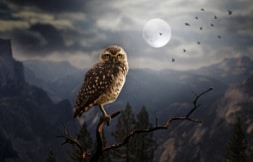 A person who remains active at night is classified as a night owl . The etymology of the term refers to two Latin words: noctis (which can be translated as “night” ) and ambulāre (translatable as “to walk” ).
A person who remains active at night is classified as a night owl . The etymology of the term refers to two Latin words: noctis (which can be translated as “night” ) and ambulāre (translatable as “to walk” ).
A night owl, therefore, wanders or wanders at night . The notion is usually used to refer to someone who is on the move when the day ends, while most people sleep .
There are individuals who are night owls by their own decision, since they feel more comfortable or even have more energy during the night. These men and women can stay awake until dawn or until dawn, carrying out different tasks or activities.
Other subjects are night owls due to force majeure: these are those who must fulfill work obligations at night. Someone who works as a receptionist in a hotel and must cover the hours from twelve at night (0 hours) to nine in the morning (9 a.m.) becomes a night owl.
It is important to mention that night owls face various difficulties by altering the body's natural sleep and wake patterns . By interrupting and modifying night rest and exposing themselves to artificial light continuously, night owls can suffer disorders in terms of their blood pressure and glucose levels , for example, increasing their risk of suffering from metabolic diseases (such as type 2 diabetes). ) and cardiac.
In fact, there are medical studies that link nightwalking with premature death. This is contrary to the health that a person who rises early can enjoy, since when night comes their natural tiredness pushes them to lie down to sleep. The aforementioned diseases add to a series of psychological and neurological disorders from which a night owl can suffer with a 10 percent greater probability than the rest of the people.
Just as humans believe that birds relate light to day and darkness to night, our brain does exactly the same thing, no matter how hard we try to adapt to a nighttime work schedule. This insistence on the part of our body opposes the needs of the night owl, preventing them from using their energies one hundred percent.
 This does not mean that night owls cannot live well, nor that they are all sick; As always, these are advice that scientists give us, based on their studies, with the aim of helping us take care of our body . In fact, most insist that no one should sleep during the day, and recommend night owls try to change their habits little by little.
This does not mean that night owls cannot live well, nor that they are all sick; As always, these are advice that scientists give us, based on their studies, with the aim of helping us take care of our body . In fact, most insist that no one should sleep during the day, and recommend night owls try to change their habits little by little.
If we leave aside the reality of those who cannot avoid working at night and focus on those who find it difficult to sleep for health reasons, then we have a relatively easier picture to solve. For most people, when night comes the desire to go to bed and rest is inevitable; However, there are many who fear that moment, because that is when their nightmare begins: they simply cannot sleep.
The worst thing is that when the morning comes they can't help but go to work or study. Without adequate rest, in addition to the aforementioned health risks , the ability to pay attention and learn is reduced, and the likelihood of accidents increases. The first step in breaking this habit is to get rid of all justifications, such as "I perform better at night," and avoid sleeping pills whenever possible, as they can lead to dependency.
Animals with nocturnal habits , on the other hand, are also usually described as night owls. Such is the case of the owl , which hunts in the dark thanks to its great auditory and visual development.
